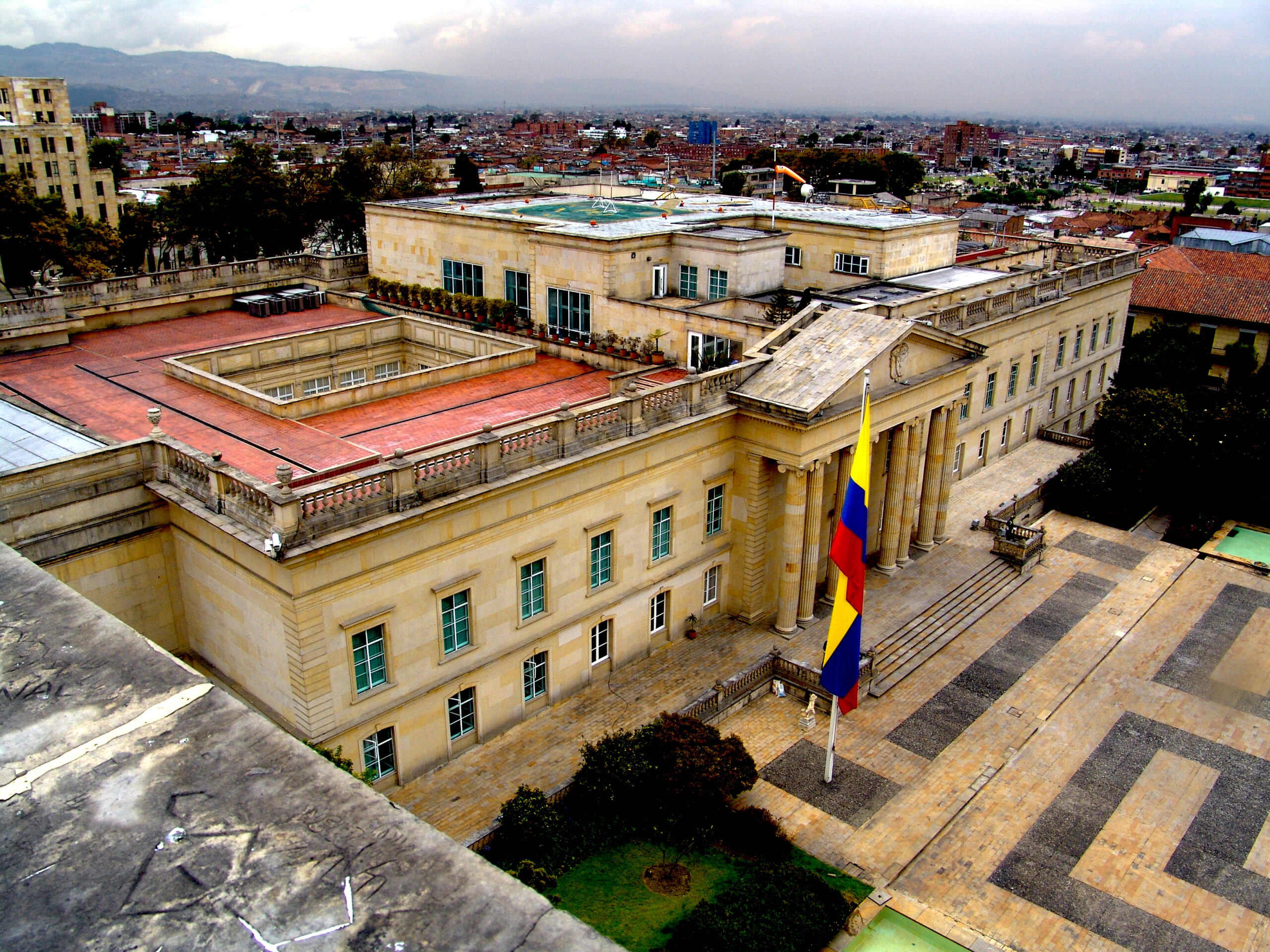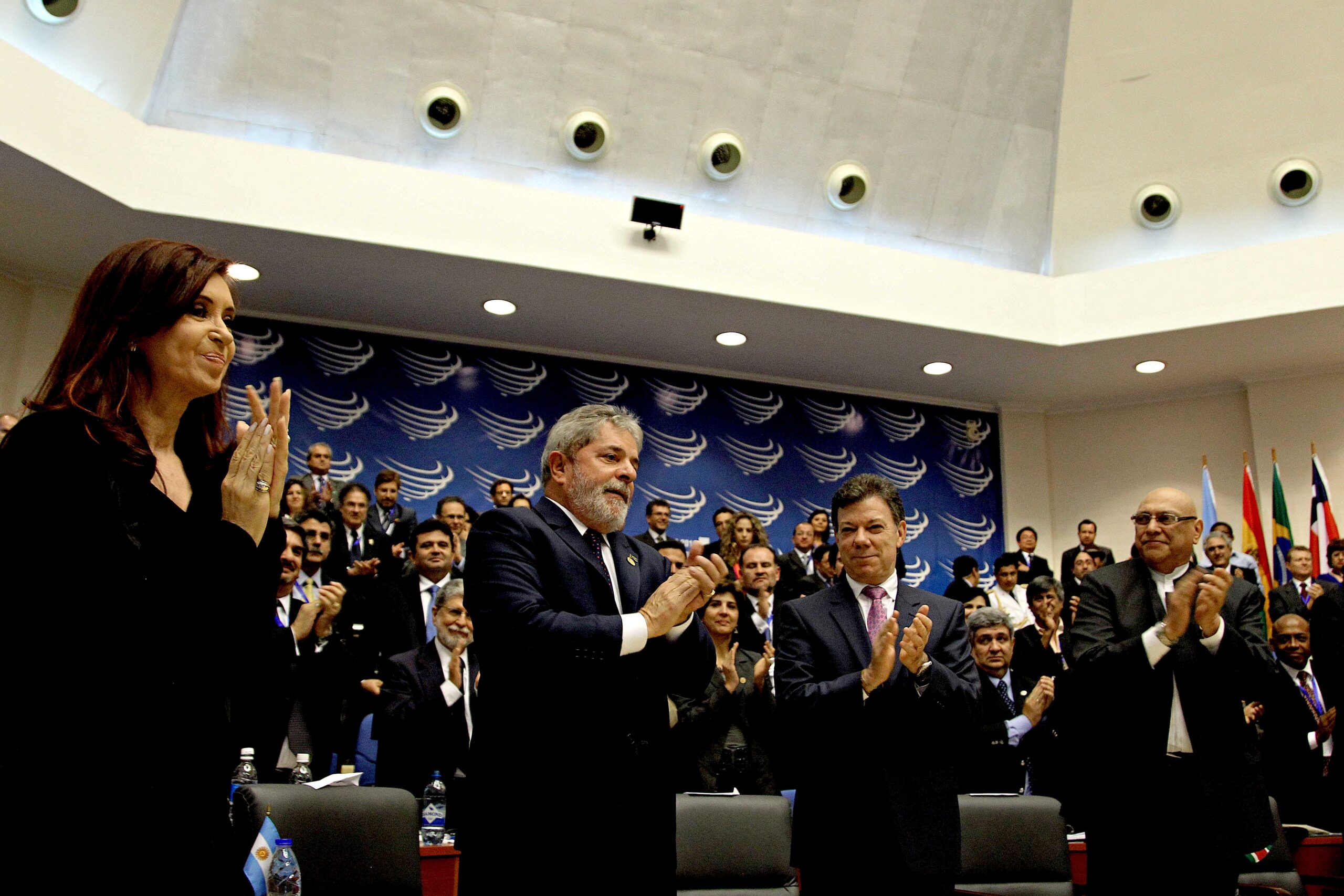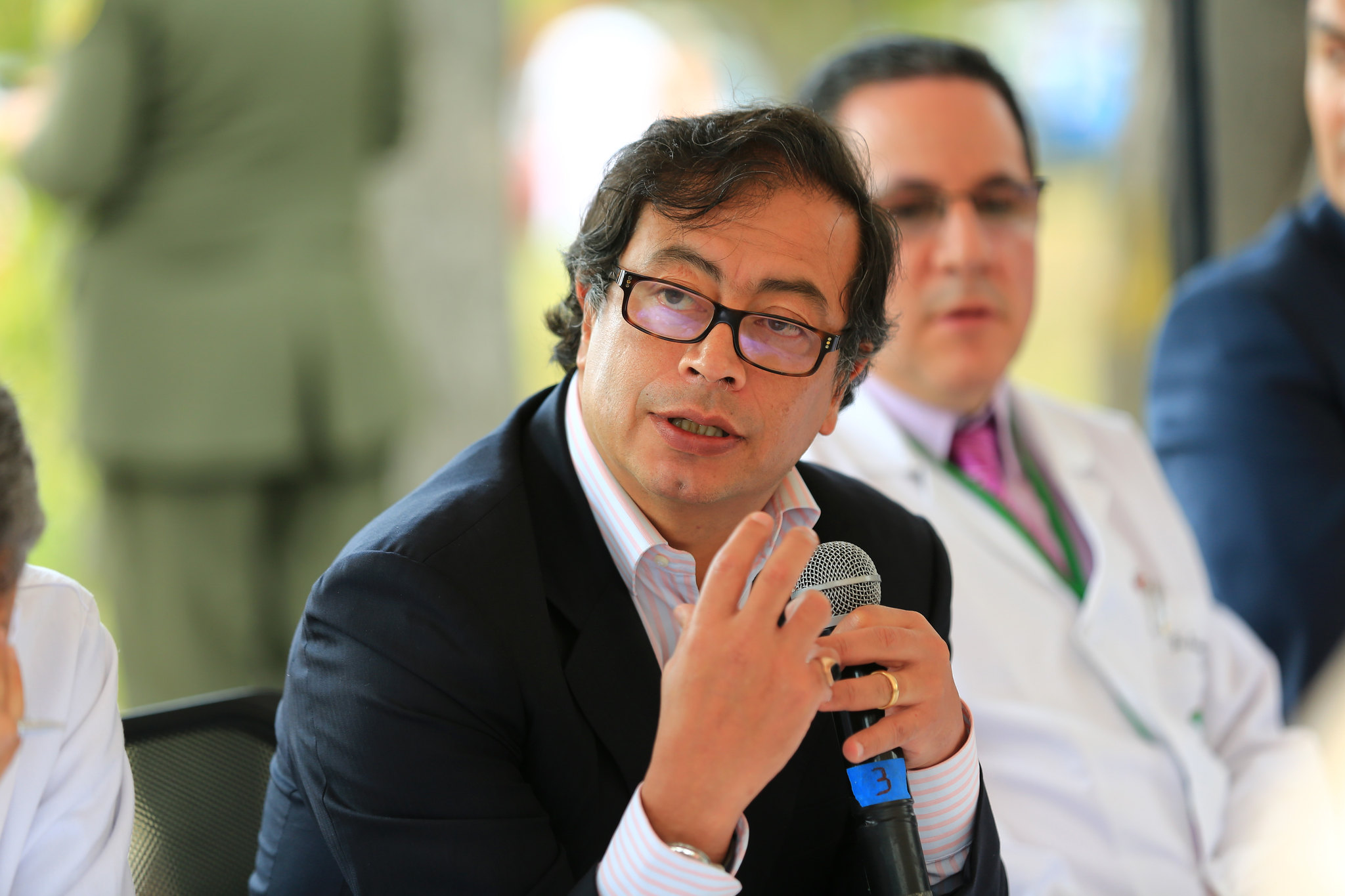The region does not want a new cold war, writes Marco Fernandes. The demand for alignment comes only from the West, not from China or Russia.

Palacio de Nariño, Colombia’s presidential palace in Bogota. (Miguel Olaya, CC BY-SA 2.0, Wikimedia Commons)
By Marco Fernandes
Peoples Dispatch
 The world wants to see an end to the conflict in Ukraine. The NATO countries, however, want to prolong the conflict by increasing arms shipments to Ukraine and by declaring that they want to “weaken Russia.”
The world wants to see an end to the conflict in Ukraine. The NATO countries, however, want to prolong the conflict by increasing arms shipments to Ukraine and by declaring that they want to “weaken Russia.”
The United States had already allocated $13.6 billion to arm Ukraine. Biden has just requested $33 billion more. By comparison, it would require $45 billion per year to end world hunger by 2030.
Even if negotiations take place and the war ends, an actual peaceful solution will not likely be possible. Nothing leads us to believe that geopolitical tensions will decrease, since behind the conflict around Ukraine is an attempt by the West to halt the development of China, to break its links with Russia, and to end China’s strategic partnerships with the Global South.
In March, commanders of the U.S. Africa Command (General Stephen J. Townsend) and Southern Command (General Laura Richardson) warned the U.S. Senate about the perceived dangers of increased Chinese and Russian influence in Africa as well as Latin America and the Caribbean. The generals recommended that the United States weaken the influence of Moscow and Beijing in these regions. This policy is part of the 2018 national security doctrine of the United States, which frames China and Russia as its “central challenges.”
No Cold War
Latin America does not want a new cold war. The region has already suffered from decades of military rule and austerity politics justified based on the so-called “communist threat.” Tens of thousands of people lost their lives and many tens of thousands more were imprisoned, tortured, and exiled only because they wanted to create sovereign countries and decent societies. This violence was a product of the U.S.-imposed Cold War on Latin America.
Latin America wants peace. Peace can only be built on regional unity, a process that began 20 years ago after a cycle of popular uprisings, driven by the tsunami of neoliberal austerity, led to the election of progressive governments: Venezuela (1999), Brazil (2002), Argentina (2003), Uruguay (2005), Bolivia (2005), Ecuador (2007) and Paraguay (2008).
These countries, joined by Cuba and Nicaragua, created a set of regional organizations: the Bolivarian Alliance for the Peoples of Our America –Peoples’ Trade Treaty (ALBA-TCP) in 2004, the Union of South American Nations (UNASUR) in 2008 and the Community of Latin American and Caribbean States (CELAC) in 2011.
These platforms were intended to increase regional trade and political integration. Their gains were met with increased aggression from Washington, which sought to undermine the process by attempting to overthrow the governments in many of the member countries and by dividing the regional blocs to suit Washington’s interests.
Brazil

Brazil’s former President Lula da Silva, second from left, during UNASUR summit in 2010 in Georgetown, Guyana. (Palácio do Planalto, Wikimedia Commons)
Because of its size and its political relevance, Brazil was a key player in these early organizations. In 2009, Brazil joined with Russia, India, China, and South Africa to form BRICS, a new alliance with the goal to rearrange the power relations of global trade and politics.
Brazil’s role did not please the White House, which — avoiding the crudeness of a military coup — staged a successful operation, in alliance with sectors of the Brazilian elite, that used the Brazilian legislature, judiciary system and media to overthrow the government of President Dilma Rousseff in 2016 and to cause the arrest of President Luiz Inácio Lula da Silva in 2018 (who was then leading the polls in the presidential election).
Both were accused of a corruption scheme involving the Brazilian state oil company, and an investigation by Brazil’s judiciary known as Operation Car Wash ensued.
Donate to Consortium News‘
2022 Spring Fund Drive
The participation of both the U.S. Department of Justice and the FBI in that investigation was revealed following a massive leak of the Telegram chats of Operation Car Wash’s lead prosecutor.
However, before the U.S. interference was uncovered, the removal of Lula and Dilma from politics brought the right wing back to power in Brasília; Brazil no longer played a leading role in either the regional or the global projects that could weaken U.S. power. Brazil abandoned UNASUR and CELAC, and remains in BRICS only formally — as is also the case with India — weakening the perspective of strategic alliances of the Global South.
Turning Tide

Gustavo Petro, presidential candidate in Colombia’s May 29 election, in 2015, while he was serving as mayor of Bogota. (Gustavo Petro Urrego, Flickr, CC BY-NC 2.0)
In recent years, Latin America has experienced a new wave of progressive governments. The idea of regional integration has returned to the table.
After four years without a summit meeting, CELAC reconvened in September 2021 under the leadership of Mexican President Andrés Manuel López Obrador and Argentine President Alberto Fernández.
Should Gustavo Petro win the Colombian presidential election in May 2022, and Lula win his campaign for reelection to Brazil’s presidency in October 2022, for the first time in decades, the four largest economies in Latin America (Brazil, Mexico, Argentina, and Colombia) would be governed by the center-left, notably supporters of Latin American and Caribbean integration. Lula has said that if he wins the presidency, Brazil will return to CELAC and will resume an active stance in BRICS.

Gustavo Petro visiting an arena in Bogota in 2015, while he was serving as mayor of Colombia’s capital city. (Gustavo Petro Urrego, Flickr, CC BY-NC 2.0)
The Global South might be prepared to reemerge by the end of the year and create space for itself within the world order.
Evidence for this is in the lack of unanimity that greeted NATO’s attempt to create the largest coalition to sanction Russia. This NATO project has aroused a backlash around the Global South.
Even governments that condemn the war (such as Argentina, Brazil, India and South Africa) do not agree with NATO’s unilateral sanction policy and prefer to support negotiations for a peaceful solution. The idea of resuming a movement of the nonaligned — inspired by the initiative launched at the conference held in Bandung, Indonesia, in 1955—has found resonance in numerous circles.
Their intention is correct. They seek to de-escalate global political tensions, which are a threat to the sovereignty of countries and tend to negatively impact the global economy. The spirit of nonconfrontation, and peace, of the Bandung Conference is urgent today.
But the Non-Aligned Movement emerged as a refusal by Third World countries to choose a side in the polarization between the United States and U.S.S.R. during the Cold War. They were fighting for their sovereignty and the right to have relations with the countries of both systems, without their foreign policy being decided in Washington or Moscow.
This is not the current scenario. Only the Washington-Brussels axis (and allies) demand alignment with their so-called “rules-based international order.” Those who do not align suffer from sanctions applied against dozens of countries (devastating entire economies, such as those of Venezuela and Cuba), illegal confiscation of hundreds of billions of dollars in assets (as in the cases of Venezuela, Iran, Afghanistan and Russia), invasions and interference resulting in genocidal wars (as in Iraq, Syria, Libya and Afghanistan), and outside support for “color revolutions” (from Ukraine in 2014 to Brazil in 2016). The demand for alignment comes only from the West, not from China or Russia.
Humanity faces urgent challenges, such as inequality, hunger, the climate crisis, and the threat of new pandemics. To overcome them, regional alliances in the Global South must be able to institute a new multipolarity in global politics. But the usual suspects may have other plans for humanity.
Marco Fernandes is a researcher at Tricontinental: Institute for Social Research (a pillar of the International Peoples’ Assembly). He is a member of the No Cold War campaign and is a co-founder and co-editor of News on China (Dongsheng). He lives in Shanghai.
This article was produced by the Morning Star and Globetrotter and was published by Peoples Dispatch.
The views expressed are solely those of the author and may or may not reflect those of Consortium News.
Help Us Beat the Censors!
Donate to Consortium News‘
2022 Spring Fund Drive
Donate securely by credit card or check by clicking the red button:

Thank you, Marco Fernandez. This is the best news I’ve heard in many months.
“To be an enemy of America is dangerous,
to be a friend is fatal”.
Henry Kissinger
“Only the Washington-Brussels axis (and allies) demand alignment with their so-called “rules-based international order.” Those who do not align suffer from sanctions applied against dozens of countries (devastating entire economies, …”
This is a very good observation. “Alignment beneficiaries” have to do their homework, like Cabo Verde did by arresting a Venezuela diplomat and extraditing him to USA for a strange crime of facilitating import of food and other necessities to Venezuela, which is “money laundering”, using bank accounts in a manner that US Treasury frowns upon. In other words, joining USA in warfares of various kind, economic, “law fare”, military. By the way of contrast, China and Russia merely propose mutually advantageous transactions, while Western pressure often prevents them to the substantial cost to the affected countries. Prime example is sabotaged pipeline agreement between Iran and Pakistan that turned dormant in “mysterious ways”, doubtless due to threats and bribes from USA. Iran lost some funds, Pakistan has electricity deficit that hampers the economy and kills people during heat waves.
No wonder that even business elites in countries like Philippines and Brazil started to see benefits of non-alignment. It is relatively easy to offer morsels to Cabo Verde or even Ecuador, but the calculus in favor of non-alignment is increasingly clear to more and more countries.
You may want peace, but the U.S. will not allow it. The U.S. will do anything necessary to maintain global hegemony. And it doesn’t matter which U.S. political party is in power.
Get rid of all the gringos once and for all. Que mal rayo los parta!
Thank you. It’s never been more clear that the American led uni-polar world is on the wrong side of history. What is most glaring is that after 30+ years of serious American uni-polarity, the world has steadily gone from bad to worse in every regard.
The American “international rules based order (our rules, our orders)” is responsible for nearly every war and conflict in the world today, while the American led neo-liberal economic order has accelerated wealth concentration into fewer and fewer hands at a continuing and now astronomical rate world-wide and has also brought us to the precipice of an environmental catastrophe that will rule the world over the next several centuries. Hell of a job. Literally, the worse job of leadership in human history.
I don’t know if Russia and China can accomplish their stated goal of establishing a non-interference, democratic and international laws based system centered on a democratized UN, but one thing is certain, the West led by the US cannot. In fact, the Western alliance is headed in exactly the opposite direction, to all our detriment.
America certainly had a spectacular opportunity and moment in history, and spectacularly blew it for no more than the sake of greed, short-term profits and ethnic hatreds. America cannot even speak the terms, a multi-polar world order of peers and a democratic UN without becoming apoplectic. Rather, the Western mantra is “zero/sum,” and “our way or the highway.” Cooperation, the one and only hope for humanity’s survival on this planet which is now being enforced by Nature herself, is not even on the Western agenda. In contrast, Russia and China are speaking and planning for this, and others are listening. In response, the only thing America can think to do is start a new war that may end us all. It’s a stark contrast.
Seeing the actual outcomes of the West’s grand plan for running the world, with the promise of more and worse to come, it’s little wonder that the rest of the world is not exactly jumping on the band wagon. The more America demands subservience, the more the world resists. I’m sure that studies of the fall of the Roman empire show a similar pattern.
By the way, somewhat related, I wonder if Taiwan is paying attention to the outcome in Ukraine. You think? The important bottom line to note in all of America’s relationships with other countries is; Who pays the bill? Not America, check out the Middle East. Taiwan might consider whether Ukraine was better or worse off before America’s meddling in 2014 and since. How about now? Since they are likely next, perhaps the citizens of Taiwan should start seriously asking themselves if they want to invite America to meddle in their affairs as well.
Sanction the yanks
How do you deal with the binary politics? Thjs nay be fine but a change of govt returns each nation into a US colony. Washington has tok much invested in uts terror basr Colombia to let it permanently depart ftom its orbit. Once the yanks arrive its damn near impossible to get rid of them.